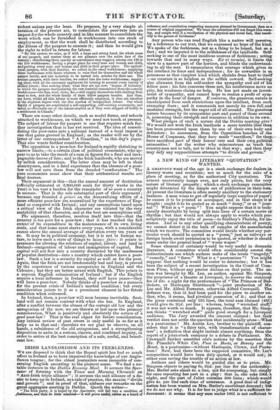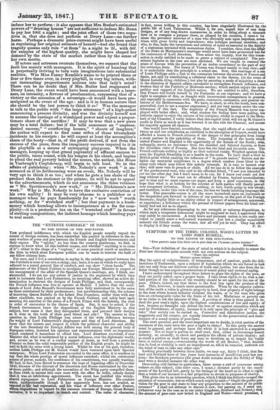A NEW KIND OF LITERARY " QUOTATION " WANTED.
A GRIEVOUS want of the age is a stock exchange for dealers in literary wares and securities ; not so much for the sake of ar place of meeting, as for the authorized City: quotations. The utmost uncertainty hangs over, not only prices, but the very nature of literary property ; which a stock exchange committee might determine by the simple act of publication in their lists. At present the literature is often merely ancillary to the stationery business. A man wises to get off regularly large supplies of paper ; he causes it to be printed as newspaper, and in that shape it is bought : ought it to be quoted as so much " demy," or as "jour- nal "I What is a" poem " ? You might suppose that it is tech- nically describable by being split into lines of a certain metre or rhythm : but that would not always apply to works which pre- scriptively enjoy the title of poem—to Southey's Thalaba, for In- stance. And as to any other qualifying characteristic of poetry, we cannot detect it in the bulk of samples of the manufacture which we receive. The committee would decide whether any par- ticular work should be quoted as a "poem," just as railways or foreign bonds await permission to be quoted, or whether it should come under the general head of "waste waper."
Some element of certainty would be very useful in dramatic literature. A committee would often considerably amend the indiscriminate use which authors make of the terms "tragedy," "comedy," and " farce." What is a "pantomime "I You might suppose that nothing would be easier to determine ; but it has been the subject of a recent investigation in the Court of Com- mon Pleas, without any precise dictum on that point. The ac- tion was brought by Mr. Lee, an author, against Mr. Simpson, the proprietor of a theatre at Liverpool, to recover the statutory fee of 40s. a night for the performance of "The Princess of Bat- tledore, or Harlequin Shuttlecock "—joint production of Mr. Lee and Mr. Alfred Forrester, otherwise Alfred Crowquill. The defence was, that 5/. had been paid for the piece to another au- thor, who, it seems, had piratical possession of it ; and that as the piece contained only 135 lines, the total sum claimed (461.) would give 63. Rd. per line ; whereas, being "wretched stuff," it was not worth so much. It appears, therefore, that Mr. Simp- son thinks "wretched stuff" quite good enough for a Liverpool audience. The Jury awarded the amount claimed ; but their verdict does not settle the question that incidentally arose—What is a pantomime ? Mr. Austin Lee brother to the plaintiff, con- siders that it is "a fairy tale, with transformations of charac- ters"; a definition that might include almost anything, from the report of a joint-stock company to a debate in Parliament. Mr. Crowquill further unsettles one's notions by the assertion that Mr. Planche's White Cat, Puss in Boots, or Beauty and the Beast, is a pantomime—without Harlequin, Clown, and Panta- loon! Now, had there been the supposed committee, Mr. Lee's composition would have been duly quoted, or it would not ; in either case saving the trouble of an action at law. Authors and others would be guided also as to price. Mr. Simpson objects to paying 6s. Old. per line for the authorship : Mrs. Butler asks about 4s. a line, not for composing, but simply for once repeating her part in a play : that is, she asks 100/. a night, and the part of Juliet contains 500 lines ; which would give 4s. per line each time of utterance. A good deal of indig- nation has been wasted on Mrs. Butler's exorbitant demand ; but we do not see why. It is for her to judge what is a sufficient in- ducement: it seems that any sum under 100/. is not sufficient to induce her to perform : it also appears that Mrs. Butler's estimated powers of "drawing houses" are not sufficient to induce Mr. Bunn to pay her 100/. a night ; and the joint effect of those two nega- tives is, that she does not perform at Drury Lane—no further harm. Perhaps a dramatic price-current might have been useful in regulating her original estimate of herself—had she found that tragedy queens only rule "at from" 5s. a night to W., with 50/. for samples of the highest quality., she might have shaped her demand by the state of the market rather than by the sense of her own merits.
If actors and actresses overrate themselves, we suspect that the fault lies mainly with managers. It is the spirit of humbug that is perpetually striving to turn vain imaginations into substantial realities. Was Miss Fanny Kemble's name to be printed three or four or five times over, in every playbill, in very big letters, with- out insinuating proportionate notions into that lady's mind? There can be no doubt that if Mrs. Butler had reappeared at Drury Lane, the event would have been announced with a large- ness, an intensity, a fervour of proclamation, surpassing that of a victory or the accession of a sovereign—it would have been pro- mulgated as the event of the age : and is it in human nature that she should be the last person to think it so? Was the manager to talk to the public with "the large utterance" of a high-priest announcing a present divinity, and was the divinity herself not to assume the carriage of a worshiped power and expect a propor- tionate share of the sacrifice ? It may be true that a new piece may be a total failure; but if the bills announce an "unprece- dented success," " overflowing. houses," "shouts of laughter," the author will expect to find some reflex of those triumphant _incidents in his receipts : he will expect at least the accomplice's share of the booty—that is, of the profit derived, if not from the success of the piece, from the imaginary success imputed to it in the playbills as a means of entrapping playgoers. When the manager, keeping up that grand pageantry of affluent success to the public, turns round, with his tongue in his cheek, and begins to plead the real poverty behind the scenes, the author, like Brass in Vanbrugh's Confederacy, will begin to talk loud. So in the affairs of publishing: when "Mr. Nobody's new work" is an- nounced as if its forthcoming were an event, Mr. Nobody will be very apt to think it so too ; and when he gets a less share of the product than the stationer or the printer, he will be apt to appeal to the advertisements, which do not announce the three volumes as"Mr. Spottiswoode's new work," or " Mr. Dickinson's new work." Why is Mr. Nobody to have the exclusive conviction of his own nullity ? It may be very irksome to a publisher or a manager when he pays handsomely for a "new work" worth nothing, or for "wretched stuff " ; but that payment is a hush- money which humbug allows to incompetence as a fee for com- plicity—it is a protective tax on the "wretched stuff" in favour of sterling compositions, the indirect homage which humbug pays to real merit.



























 Previous page
Previous page